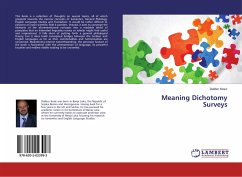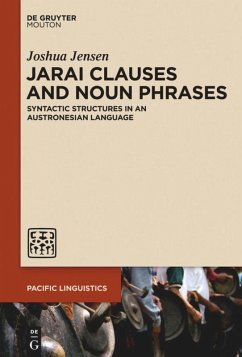
Beyond Words and Phrases
A Unified Theory of Predicate Composition
Versandkostenfrei!
Versandfertig in 6-10 Tagen
52,99 €
inkl. MwSt.

PAYBACK Punkte
26 °P sammeln!
This volume presents a computational model ofpredicate composition that derives thedistinct properties of ``words'' and ``phrases''within a single component of grammar and itsinterface conditions, thus providing an insight intothe interaction between morphology and syntax.Based on a cross-lingual study of complex predicatesand verb phrase aspect, with special focus onArmenian and Persian,Megerdoomian isolates the primitive atoms used toencode meaning in the syntactic code and argues forparallel nominal and verbal structures. The notion ofword is thus defined as a level in the syntacticstructur...
This volume presents a computational model of
predicate composition that derives the
distinct properties of ``words'' and ``phrases''
within a single component of grammar and its
interface conditions, thus providing an insight into
the interaction between morphology and syntax.
Based on a cross-lingual study of complex predicates
and verb phrase aspect, with special focus on
Armenian and Persian,
Megerdoomian isolates the primitive atoms used to
encode meaning in the syntactic code and argues for
parallel nominal and verbal structures. The notion of
word is thus defined as a level in the syntactic
structure and the distinction between a "word" and a
"phrase" is characterized by the structural
complexity of the constituents involved in the
formation of a particular predicate. The distinct
syntactic and semantic properties of words and
phrases can be captured straightforwardly from the
resulting configuration and the interface conditions.
In the computational model developed, lexical
entries, combined with the spell-out node to the PF
component, determine the parameters for language
variation and can derive the structure-meaning
mismatches observed in verbal predicates.
predicate composition that derives the
distinct properties of ``words'' and ``phrases''
within a single component of grammar and its
interface conditions, thus providing an insight into
the interaction between morphology and syntax.
Based on a cross-lingual study of complex predicates
and verb phrase aspect, with special focus on
Armenian and Persian,
Megerdoomian isolates the primitive atoms used to
encode meaning in the syntactic code and argues for
parallel nominal and verbal structures. The notion of
word is thus defined as a level in the syntactic
structure and the distinction between a "word" and a
"phrase" is characterized by the structural
complexity of the constituents involved in the
formation of a particular predicate. The distinct
syntactic and semantic properties of words and
phrases can be captured straightforwardly from the
resulting configuration and the interface conditions.
In the computational model developed, lexical
entries, combined with the spell-out node to the PF
component, determine the parameters for language
variation and can derive the structure-meaning
mismatches observed in verbal predicates.












